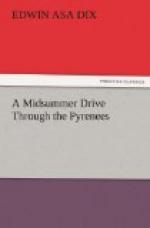In one apartment, however, we make a stand. The herd and its shepherd can pass along. This, he has told us, is the birthplace of Henry IV. The floor is polished like the rest, and the furniture has been in part renewed, but the room is the same which that alert baby first laughed upon. In the corner at the right is an antique bed of carved walnut, with four posts and a rich canopy. Around its side are cut in the wood an elaborate series of medallions, each a foot square, representing the heads of the kings of France. Across the apartment swings still a great tortoise-shell, which served the royal infant for a cradle,—saved afterward from the furies of the Revolution by the substitution of a false shell in its place.[15]
[15] The genuineness of the present shell has frequently been questioned; but the testimony of LAGREZE has now fairly established the story of its preservation.
In this room, Jeanne d’Albret sang a Bearnais song as the hero of Ivry was born, and so won the wager with her martial old father, the King of Navarre; and the boy came into the world smiling and unafraid. And writers tell us how delighted the old king was, and how he took the infant into his arms, and rubbed its lips with a garlic clove, and tilted into its little mouth from a golden goblet some drops of the manly wine of Jurancon. When Queen Jeanne herself was born in this very castle, twenty-five years before, the Spaniards had sneered: “A miracle! the cow (of the arms of Bearn) has given birth to a ewe!” “My ewe,” exclaimed the happy old father now, “has brought forth a lion! Tu seras un vray Bearnais!”
VII.
Henry’s life was as martial and as merry as his grandfather sought to form it. He grew up on the coteaux in a hardy, fresh-air life, and at nineteen became King of Navarre,—the title including Bearn and Foix. Into this old room in the castle where we stand throng reminders of his career, its beginnings so closely twined with Pau. Independent still as under Gaston, the sovereigns of the stout little kingdom had lived friends but no subjects of the King of France; and the Court at Pau, always proud and autonomous as the Court at Paris, had become defiantly Protestant besides. And now if ever it had a sovereign after its own heart. Henry was kingly, but a king of the people. He had their spirit. His long, keen, grizzled face was alight with ready comradeship. “I want my poorest subject,” he said, “to have a fowl for his pot on Sundays.” He was a Bearnais from sole to crown,—in bravery and craft, tact and recklessness, in virtues, and—which pleased them as much—in vices. “He was plain of speech, rough in manner,—with a quaint jest alike for friend or foe; his hand upon his sword, his foot in the stirrup, his gun slung across his shoulder, the first in assault, the last in retreat. Irregular in his habits, eating at no stated times, but when hungry voraciously devouring




